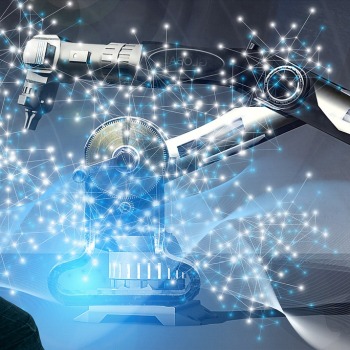
Robots that perform tasks independently and automatically are increasingly being used in companies, but they also harbor risks in terms of cyber security, as a recent Kaspersky survey of employees in Germany shows.
While more than half (55 percent) of respondents think robots should be used more widely in various industries, 80 percent fear they could be hacked. 38 percent even know of cases where this has happened.
Cyber security: Robots can also be hacked
Industrial robots are used, for example, as robot arms on assembly lines and as driverless transport systems as well as autonomous mobile robots in the form of humanoids or delivery robots. In Germany they will mainly used by automobile manufacturers and suppliers as well as in the metal industry. According to a Kaspersky survey, 37 percent in Germany are already using robots, and another 25 percent are planning to do so in the next two years.
The increasing use of robots can be attributed to their advantages. They replace manual labor and lead to optimized efficiency, speed, quality and performance. Almost half (44 percent) of those surveyed say that the use of robots increases the efficiency of production processes and reduces costs. 50 percent believe that robots can free people from difficult or dangerous tasks and thus reduce the risks to life and health in the future. A third (35 percent) also believe that boring or routine tasks could be avoided and that more attractive and better-paid positions could be achieved as a result. Furthermore, 30 percent see creating a safe environment and reducing the likelihood of accidents due to human error as one of the most important tasks for robots.
Robots are not yet adequately protected
Despite the many advantages, respondents are concerned about the cyber security of robots: the majority (80 percent) believe that robots can be hacked. More than a third (38 percent) even know of such incidents in their or other companies. Similarly, around half (43%) believe there are not enough cybersecurity measures in place to protect robots; only 39 percent are convinced that sufficient protective measures exist.
Andrey Strelkov, Head of Industrial Cybersecurity Product Line at Kaspersky comments: “New technologies are potentially vulnerable to cyber threats. At Kaspersky, we see it as our responsibility to ensure that cybersecurity is at the forefront of robotic technology adoption. We want to face these challenges and seize opportunities. Before robots are integrated into production, both the robustness against network intrusions and the general network security must be guaranteed. Because not all modern technologies are designed for security, so only the use of comprehensive protection for industrial networks and multifunctional monitoring platforms can ensure uninterrupted business operations. Dedicated solutions like Kaspersky Industrial CyberSecurity protect robots in production.”
Recommendations for protecting industrial computer systems
- carrying out more regularly Security assessments of OT systems to identify and resolve potential cybersecurity issues.
- Continuous vulnerability assessment and triage as the basis for effective vulnerability management using special solutions such as Kaspersky Industrial CyberSecurity.
- Prompt installation of updates and patches for the key components of the company's OT network.
- Implementation of EDR solutions for industrial companies such as Kaspersky Industrial Cybersecurity for Nodes, which enable timely detection, investigation and remediation of complex threats.
- Dedicated security training for IT security teams and OT personnel to optimize response to advanced threats.
About Kaspersky Kaspersky is an international cybersecurity company founded in 1997. Kaspersky's in-depth threat intelligence and security expertise serve as the basis for innovative security solutions and services to protect companies, critical infrastructures, governments and private users worldwide. The company's comprehensive security portfolio includes leading endpoint protection as well as a range of specialized security solutions and services to defend against complex and evolving cyber threats. Kaspersky technologies protect over 400 million users and 250.000 corporate customers. More information about Kaspersky can be found at www.kaspersky.com/
